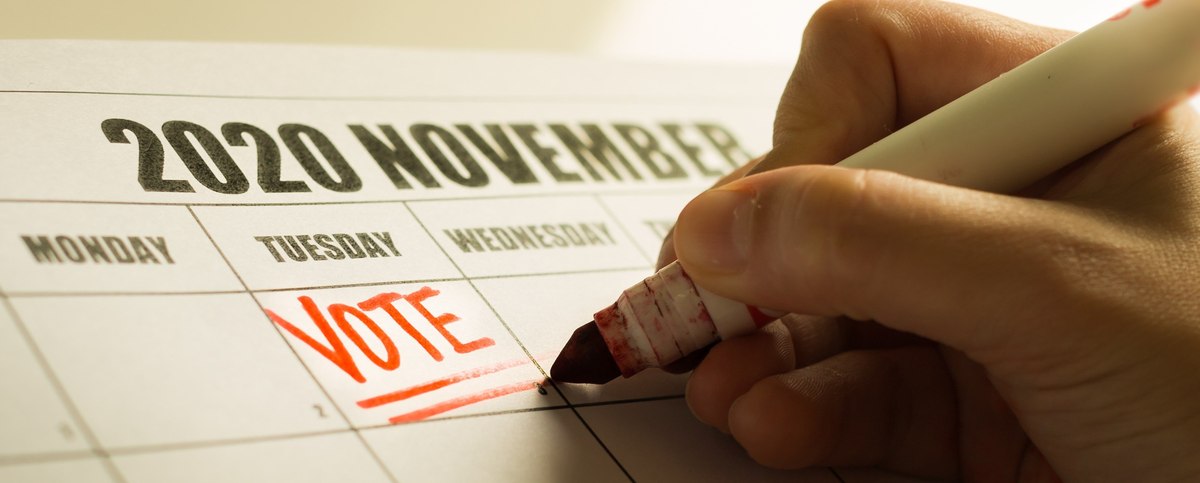American voters aren't sure if they’ll know who won the presidency on Election Night before they tuck in for bed. But the latest Economist/YouGov Poll suggests they don’t expect a long slog, like the more than month-long delay that happened after the 2000 election, when the Supreme Court ruled that Republican George W. Bush had defeated his Democratic opponent, Al Gore. This year, most registered voters expect it will take just a few days or even fewer to learn the outcome.
Despite all the apocalyptic predictions by journalists – and even President Donald Trump – that it will takes weeks or even months (the president once even suggested it would take years) to learn the outcome, a majority (57%) of all registered voters expect that it may take just a few days to know who won. Nearly two in four (39%) believe the public will know on Election Night (22%) or the next day (17%). The president’s supporters are both more optimistic than Biden’s supporters about the speed of vote counting and projections, and more likely to believe it will take a month or more before the outcome is known.
President Trump continues to trail former Vice President Joe Biden among likely voters. About half (51%) of likely voters in this poll say they will vote for Biden, while 42 percent will vote to re-elect the president. Biden is ahead in every region but the South. Independents are divided with 41 percent supporting Biden and 37 percent supporting Trump.
Despite the Democratic nominee’s lead nationwide, his supporters are far less optimistic than the president’s voters are about the final outcome. While nine in 10 Trump supporters believe the president will win re-election, just two-thirds (68%) of Biden voters believe their candidate is headed for a victory in November. That doesn’t mean Biden voters expect a Trump victory (though 7% do), but one in four Biden supporters — perhaps remembering 2016 — report they aren’t sure what the final outcome will be.
One thing the Democrat’s voters are optimistic about it that their own vote will be counted accurately. Nearly two-thirds of Biden supporters (64%) have a great deal or quite a bit of confidence their vote will be counted as they cast it. Fewer than half of Trump supporters (46%) say that is the case with their vote.
How one casts a ballot this year doesn’t have a large impact on confidence whether it will get counted. Biden voters who say they will vote in person on election day are only a little less confident than those who will vote before then, either in person or by mail. The president’s voters who plan to vote by mail are less confident than other Trump voters about accuracy counting their vote. Only 22 percent of Biden voters plan to wait until election day to cast their ballot; 52 percent of the president’s supporters will vote in person on election day.
There is somewhat less confidence in the fairness of the election overall. Just a third of all voters have a great deal or quite a bit of confidence that the election will be held fairly; another third have a “moderate” amount of confidence. There is much less difference between each candidate’s supporters on this question than there is on the question of their own vote getting counted properly.
One thing voters are worried about is what happens after the election is over, given the intensity of the contest. Will there be protests? More expect there will be protests, more so if the president is re-elected than if Biden wins. Voters on both sides are evenly divided on the prospect of protests following a Biden victory; but more than three in four expect protests if the president wins. Most of those who expect protests worry in each case that the protests could turn violent.
Related: Most Americans expect mass protests if Donald Trump is re-elected
See the toplines and crosstabs from this week’s Economist/YouGov Poll
Methodology: The Economist survey was conducted by YouGov using a nationally representative sample of 1,500 U.S. adult citizens interviewed online between September 13 - 15, 2020. This sample was weighted according to gender, age, race, and education based on the American Community Survey, conducted by the US Bureau of the Census, as well as 2016 Presidential vote, registration status, geographic region, and news interest. Respondents were selected from YouGov’s opt-in panel to be representative of all US citizens. The margin of error is approximately 3.4% for the overall sample.
Image: Getty









